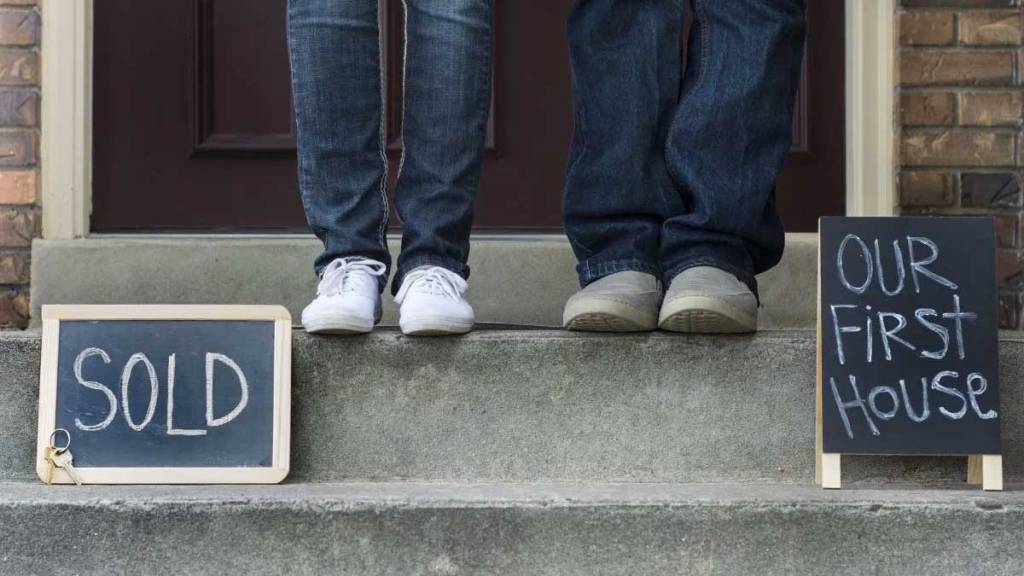Here’s what we know: buying your first home can feel intimidating, especially when the headlines scream, “Mortgage rates are up!” one day and “Mortgage rates are down!” the next. The rollercoaster of economic news is enough to make anyone freeze up.
But the reality is that homeownership isn’t about being a Wall Street wizard or trying to time the market. It’s about building a life, creating stability, and investing in your future. You’re not buying a stock. You’re buying your kitchen and family area, your future backyard, your kid’s first bedroom.
So, let’s shut out the noise and focus on what really matters. Here’s what you need to know, do, and ask to confidently buy your first home, even with today’s mortgage rates.
Let’s get real about interest rates
First things first, let’s ditch the panic. Those rock-bottom 2% mortgage rates we saw during the pandemic? That was a unicorn moment. A once-in-a-generation event caused by a global crisis. Historically, mortgage rates around 7% to 8% have been totally normal.
And guess what? People still bought homes even when rates were high. People built wealth, started families, and created financial stability, all while paying higher rates than what we’re seeing now.
Let’s go back in time for a second. In the early 1980s, interest rates were over 18%. Yep, you read that right. And yet, people still bought homes. Because smart buyers understood something important: you date the rate, but you marry the house. Rates are temporary. Equity is forever.
If you wait for “perfect” conditions, you could end up watching prices and rents keep climbing while you’re stuck on the sidelines. Don’t let today’s rate make you miss out on tomorrow’s opportunity.
What 6.5% means for your budget
Let’s say you originally budgeted for a $450,000 home when rates were hovering around 5%. Now they’re closer to 6.5%, and you’re wondering if that means your dream just slipped out of reach.
The reality? It just means you might need to get creative. That same monthly payment at 6.5% might buy you closer to a $385,000 home instead of $450,000. But that doesn’t mean you have to sacrifice your dreams. You just need a better strategy.
Creative buyer hacks to keep monthly payments in check
Here’s a toolkit of smart moves you can use to stay in your price range, even when rates rise.
Financing Fixes
- Buy down the rate (pay points upfront)
This means paying extra at closing to lock in a lower interest rate. Each “point” costs 1% of the loan amount and typically shaves about 0.25% off the rate. It’s a solid strategy if you plan to stay in the home for a while as it lowers your payment every single month. - Use a temporary rate buydown (2-1 or 3-2-1 buydown)
These programs reduce your interest rate for the first few years (e.g., 2% lower the first year, 1% lower the second, then your full rate after that). It’s a great bridge if you expect your income to rise or plan to refinance. - Shop around with mortgage brokers, not just banks
Banks offer their own loan products. Brokers shop everybody’s loan products. Even a 0.25% lower rate from one lender to another can mean thousands saved over the life of your loan. - Consider adjustable-rate mortgages (ARMs)
These start with lower rates than fixed loans and adjust later. If you know you’ll sell or refinance in a few years, this could be a smart play — just make sure you understand the risks. - Stretch the loan term (cautiously)
Some lenders offer 40-year mortgages or interest-only loans. This lowers the monthly, but it also means slower equity growth. Not a forever loan, but possibly a short-term solution.
Property & tax considerations
- Look in areas with lower property taxes
Monthly payments aren’t just about the loan — they include taxes and insurance, too. Choosing a town with lower property taxes can give you more buying power without increasing your monthly. - Skip the HOA or find a low-fee one
HOA fees can add $200–$400 a month (or more). That’s money that could’ve gone toward your loan instead. Homes without HOAs (or with minimal fees) give you more wiggle room. - Widen your search area
Sometimes driving just 10–15 minutes outside the “hot” neighborhood can save you tens of thousands on the purchase price. You may find more home, lower taxes, and better deals — without giving up lifestyle.
Money moves that matter
- Make a bigger down payment
More money down = less money borrowed = lower monthly payment. It also reduces your PMI (private mortgage insurance), which can be a hefty monthly cost for buyers putting down less than 20%. - Take advantage of down payment assistance programs (DPAs)
Many state and local governments offer grants or forgivable loans to help first-time buyers. These can cover down payments or closing costs, freeing up your funds to buy points or keep more in the bank. - Use gift funds wisely
If a family member is helping out, talk to your lender early to structure the gift properly. That money can help you qualify for a better loan or reduce your mortgage burden.
Other smart tactics
- Negotiate with the seller to buy down your rate
Instead of asking for a price drop, ask the seller to put money toward buying down your interest rate. This often makes a bigger difference in your monthly cost and benefits both sides. - Consider fixer-uppers with good bones
Cosmetic issues like paint or outdated cabinets can scare off other buyers — but give you a chance to build equity fast. A little elbow grease = big return. - Work with a real estate agent who understands creative financing
The right agent can help you explore things like assumable mortgages (where you take over the seller’s low rate), seller financing, or new construction incentives. There are more options than you think—but only if your agent knows how to find them. - Embrace the “Buy Now, Refinance Later” strategy
Nobody has a crystal ball, but if rates drop, you can refinance. If they rise, you’ll be glad you locked in now. Meanwhile, you’re building equity and planting roots.
You’re not just buying a house — you’re building a future
Here’s the deal: homeownership isn’t just a financial transaction; it’s a life milestone. It’s your chance to create security, build wealth, and lay the foundation for everything that comes next.
Yes, it’s emotional. Yes, it can be overwhelming. But that doesn’t mean it’s not the right time—it just means you need the right plan.
If you wait for the “perfect market,” you might wait forever. The most successful homebuyers aren’t the ones who timed the market perfectly — they’re the ones who made a move, stuck with it, and built equity over time.
So don’t let fear—or headlines—talk you out of taking action. Talk to a trusted real estate professional. Partner with a smart lender. And start putting together your strategy today.
Because your future home? It’s not just where you’ll live. It’s where your new story begins.
Darryl Davis, CSP, has spoken to, trained, and coached more than 600,000 real estate professionals around the globe. He is a bestselling author for McGraw-Hill Publishing, and his book, How to Become a Power Agent in Real Estate, tops Amazon’s charts for most sold book to real estate agents.
This column does not necessarily reflect the opinion of HousingWire’s editorial department and its owners.
To contact the editor responsible for this piece: tracey@hwmedia.com







